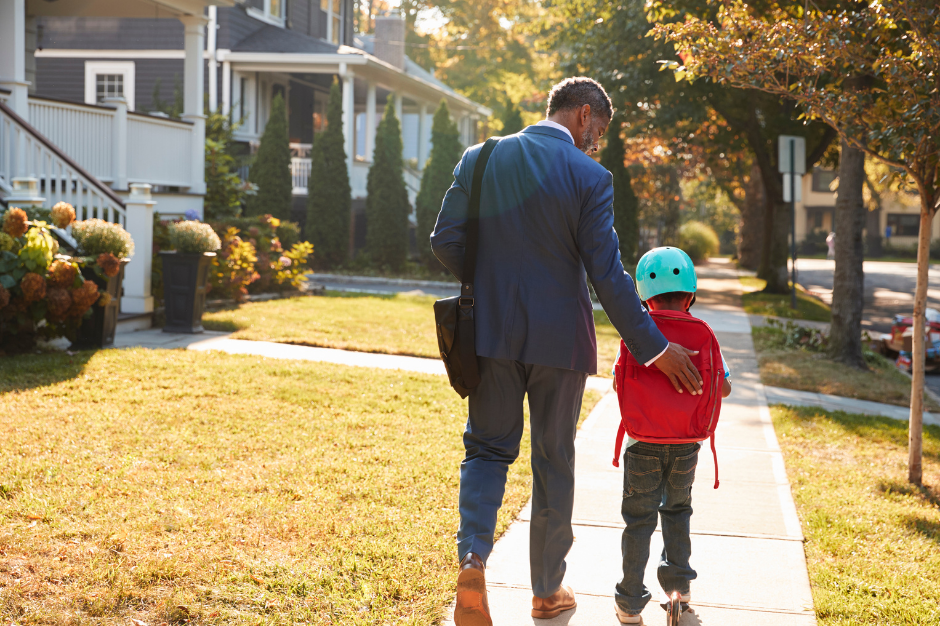Children tend to feel anxious about big changes. So, it’s understandable that for many students, going back to school can be challenging. Even kids who are usually pretty easy-going get butterflies, and kids prone to anxiety get clingier and more nervous than usual.
Some common worries include:
- Who will be my new teacher and what if s/he is mean?
- Will any of my friends be in my class?
- Are my clothes OK?
- Will I look stupid?
- Who will I sit with at lunch?
- What if I miss the bus?
- What if math is too hard for me?
- I can’t remember anything I learned last year!
- What if something bad happens to mom or dad while I am at school?
When children are feeling anxious it directly impacts their ability to learn. So, as you prepare for the school year ahead, it’s important to be proactive in helping your young person navigate the emotional highs and lows. Here are some tips for easing their back-to-school fears and helping them cope:
Strategies
- Don’t pass your stress on to your child – This is often a stressful time of year for parents too. So, as a parent, you should be practicing some self-care to manage your stress. Try to remain calm around your child.
- Listen and validate – Ask your child what they are feeling nervous or scared about. Simply listen and resist the urge to start talking. Let them lead the conversation. Then, show them you understand and empathize. Reassure them. If your child knows they have a safe place to share their emotions without interruption, they will be more likely to communicate with you and accept your help.
- Problem solve – Once you know what’s bothering your child, you can start to develop a coping plan. Anxious youth are often poor problem solvers and doubt their ability to cope. Addressing your child’s fear head on, by creating an active plan with concrete solutions, will significantly reduce the worry. For example, “If (the worst) happens, what could you do?” or “Let’s think of some ways you could handle that situation.” This gives you the opportunity to coach your child on how to cope with (and interpret) both real and imagined scary situations.
- Prepare in advance – Talk to your child about what school will be like. Anxious kids often do better when they have all the information about the start of school in advance so they can process. Go over their schedule as many times as they need it and have their supplies ready. Sometimes, even a test run is helpful. Take your child to visit their classroom and show them their desk, if possible.
- Break summer sleep habits – Get on a school sleep schedule during the last weeks of summer break, so they will be able to get up in the mornings. Remember, a well-rested child is a more resilient child. Consider having your child start going to bed 15 means earlier every night in the week or two before the start of school.
- Remind your child of the positives – While it is important to validate your child’s feelings, it is also helpful to remind them of the things they like about school. Have conversations about recess, activities, classes or teachers they enjoy. Sometimes anxious kids forget that they actually have fun at school.
- Avoid the morning rush – Even if it means getting up a few minutes earlier, giving your family enough time to get ready and out the door, is key to maintaining calm. Having your child pack up everything they need for school and decide what clothes to wear the night before, will likely ease the stress in the morning.
- Ensure they eat a nutritious breakfast – When your child’ body is nourished, tackling school worries is easier. Just like getting enough sleep, having a healthy breakfast will help your child cope better with the stresses of the day.
- Encourage your child to practice self-care – Older children and teens can take charge of their well-being. Encourage them to make sure they get enough sleep, make healthy eating choices and exercise.
- Reach out for help – Let your teachers know if your child is anxious before the start of school. Share some of your child’s specific fears. This way the adults in the classroom can be on the lookout and jump in if their student seems to be having a hard time.
The best you can do for your child is to be vigilant for changes in mood or behaviors that may indicate that they are struggling with the start of school. If they appear to be upset, anxious or resistant to going to school beyond those first days and you are concerned about their mental health, contact your physician for an evaluation or reach out to a qualified mental health professional.


